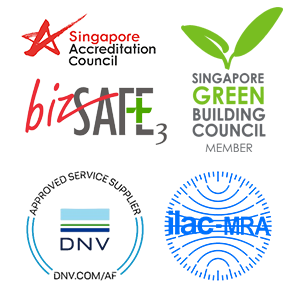1). NEA Boundary Noise
The measurement would be performed based on regulation for the “Environmental Pollution Control (Boundary Noise Limits for Factory Premises) Regulations 1999. As required, the proposed measurement would be taken at the following time interval: –
Day – 0700hrs to 1900hrs
Evening – 1900hrs to 2300hrs
Night – 2300hrs to 0700hrs
The Equivalent Continuous Sound Pressure Level (LAeq) for the above three intervals would be taken with interval recording of LAeq at five minutes. A report would be issued upon completion of the test. The above measurement is based on location/s to be selected by the client or on the basis of selection for proposed location/s for measurement based on a quick survey of the surrounding perimeter of the facility with a sound level meter. Interpretation of the results obtain would not be included in this test, but reference to the regulation would be.
2). MOM Workplace Noise Monitoring
Sound mapping and measurement of machine noise levels to be compared with the “Workplace Safety and Health (Noise) Regulations 2011”.
Workplace noise monitoring consists of area noise monitoring, usually arising from machinery noises and processes, testing for the presence of excessive noise levels. In general, monitoring helps assess the workers’ level of exposure to hazards as well as assess the effectiveness of control measures. Regular monitoring performed by a recognized competent person is recommended to be conducted once every 3 years.
3). MOM Personal Dosimetry
Personal noise monitoring tests the noise levels that specific groups of workers are exposed to. Test results of workplace monitoring are used to evaluate and take the necessary measures to safeguard the workers’ health.
A person is deemed to be exposed to excessive noise, if the noise that he would be exposed to, when not wearing hearing protector, exceeds: –
- The permissible exposure limit for noise specified in the schedule
- The equivalent sound pressure level of 85 dB(A) over 8 hours work day
- A peak sound pressure level exceeding 140 dB(C).
4). Ambient Noise
Measurement of ambient noise levels in indoor spaces, mainly for Green Mark Sustainability projects for comparison to “SS 553 : 2016, Singapore Standard, Code of Practice for Air-conditioning and Mechanical Ventilation in Buildings, Table 4 – Recommended Ambient Sound Level”.


